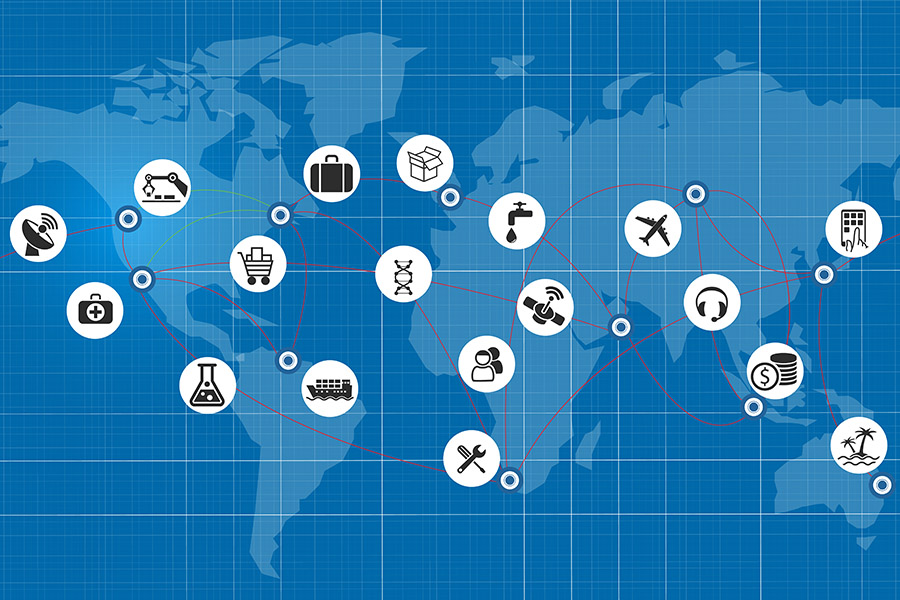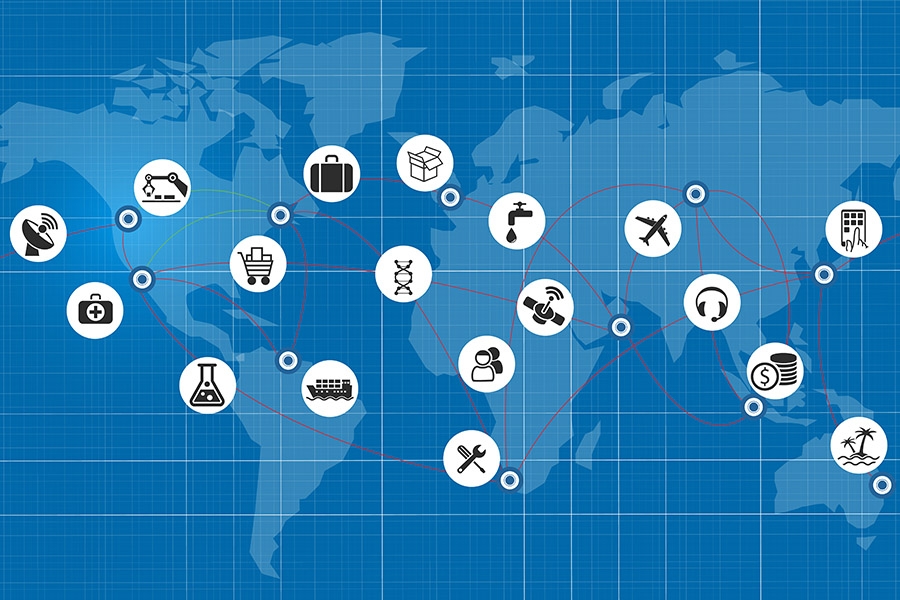The pandemic has laid bare the shortfalls of relying on overseas suppliers.
It was a sign of desperation. The Oregon Nurses Association launched a campaign on April 10 asking the public to sign a petition urging Gov. Kate Brown to insist that health care employers provide medical gear to protect frontline workers from contracting COVID-19.
The lack of personal protective equipment such as face masks, face shields and gowns for health care workers around the world is glaring evidence of the flaws in the global supply chain for medical products.
Most protective gear for health workers is made in China, where the COVID-19 outbreak originated. The country’s efforts to control the virus meant factories curtailed production and freight transportation slowed while, at the same time, global demand for protective gear soared.
The world is facing, for the first time, the life-threatening implications of a breakdown in the globalized economy.
U.S. manufacturers have heeded requests for protective medical gear by converting their production lines. In Oregon the most high-profile manufacturer to do so is sports apparel maker Nike, which is making face shields and respirator mask lenses for U.S. health care workers.
Smaller manufacturers — including Sailworks, a Hood River maker of windsurfing gear, and local distilleries — have also switched to making protective medical products, such as hand sanitizer.
RELATED STORY: Coronavirus: Manufacturers Switch Gears
It is not just medical equipment that is in short supply. So much U.S. manufacturing has moved offshore that the pandemic has created supply-chain delays across product lines from clothing to food to electronics.
This upheaval could accelerate a pushback against globalization that was already growing before the pandemic. The Trump administration has fomented much of the opposition to a globalized economy by imposing tariffs on trade partners, most notably China. President Donald Trump has made it clear that he wants to bring manufacturing back to the U.S.
Could the pandemic speed up the return of manufacturing, a process known as reshoring? Some experts think it could and that it provides a chance to create jobs.
Mike Vanier, vice president of client engagement at the Oregon Manufacturing Extension Partnership, a nonprofit business management consultancy, has a good overview of how the pandemic has affected manufacturers’ supply chains across the state. He has participated in hundreds of calls with product makers over the past several weeks. He says the pandemic has affected the supply chain in three main ways.
Firstly, manufacturers have been impacted by the closure of so-called upstream suppliers that had to shut because of social-distancing protocols or to protect their workforces.
Secondly, some product makers face a lack of raw materials, which are being diverted to make critical medical products, such as face masks.
Lastly, companies are holding back on production because they are uncertain about future demand. This has impacted manufacturers further down the supply chain that are unable to procure materials for their own production.
Vanier says the impact of the pandemic on manufacturers runs the gamut, from businesses that have seen no impact to those that have experienced severe curtailment in their operations to companies that have had to ramp up production because of increased demand.
Food processors and metal manufacturers, in particular, show a broad range of impacts. “There are ones that are booming and there are ones that shut down because of workforce concerns and supply-chain issues,” says Vanier.
Valerie Ells, chief financial officer of Laird Superfood in Sisters, which makes shelf-stable health foods, says the company has seen increased demand for its products online and in grocery stores. It sources some ingredients, such as coconut, from abroad, and there are delays in shipping those products, though they are still arriving at its factory.
Manufacturers that have a niche product, such as specialty-food makers, tend to be the most negatively impacted, says Vanier, because a lack of product diversification means they are most vulnerable to supply-chain disruptions.
Companies that rely on so-called “just-in-time” delivery, a practice of ordering products only when they are needed, are at most risk of a breakdown in the global supply chain. These companies have reduced excess inventory to cut costs. For example, some car makers will only have parts delivered hours before they are scheduled to be used on the assembly line.
That business model has now come under stress as the products they depend on from overseas are slowed or stopped as borders and overseas factories close.

The upheaval has resulted in some companies either considering making their own products or switching to a domestic supplier, says Vanier.
He cites the example of a paper manufacturer that uses wire in its products. The wire is in short supply because it is being used to make protective equipment for health care workers. The company is considering finding a domestic supplier or “even retooling” its operations to make the wire itself, says Vanier.
Another example is a local manufacturer of nutritional supplements, which used an overseas facility to blend ingredients to make its finished products. Because of supply-chain disruptions, the company is seeking to either find a U.S. operator to do that task or do it themselves.
Vanier supports onshoring, arguing that it creates jobs, shortens lead times and can improve cash flow. “If you are shortening lead times, you reduce volatility. You can reduce the inventory you have to carry to mitigate volatility in the supply chain.”
But what about cost? For decades manufacturers have relied on overseas suppliers because of lower labor costs in places like China. Many products can no longer be sourced in the U.S. because of this decades-long trend.
The iPhone is an example of a product that relies on the globalized supply chain. Parts are sourced from all over the world to make the device. If it was made solely in the U.S., it is estimated it would cost three times as much to make, and consumers would have to pay around $2,000 for the phone, a multiple of the retail price.
Cheap overseas labor, however, is no longer a given in places like China. Cost savings from overseas production have actually decreased over time as wages have increased in Asian manufacturing hubs.
Some manufacturers have embraced sourcing and making products entirely in their own factories. Urban Gypsum, a maker of recycled gypsum — a mineral that is widely mined and used in fertilizer and drywall — sources all its materials domestically. The company, based in North Portland, was started three years ago by Casey Lane, who also owns a demolition and an excavation company.
Gypsum is the main commodity found in sheet rock used in construction. It is usually mined and imported from countries such as Mexico and Canada. More than 15 million tons of it ends up in landfills annually. The portion that is recycled is usually sent overseas for processing, then imported back into the U.S.
Lane’s company extracts gypsum from sheet rock in a Portland facility. His company produces products from the mineral that can be used as fertilizer, in cement production and in new wallboard. Lane sources all of the sheet rock domestically, usually from construction companies and large manufacturers in Oregon and Washington.
The pandemic has caused a slowdown in the supply of sheet rock because of less construction activity, says Lane. But he adds the pandemic would have hurt his business more if he had to source sheet rock from overseas. “The reason we are successful is that we aren’t reliant on material coming from imports,” says Lane. “If I had to wait for inbound material, it would cripple our company.”
Lane also built his recycling facility entirely using equipment sourced from the U.S. The hardest part was finding all the parts from a variety of domestic suppliers, he says. He could have gone to one overseas supplier and had it all shipped to the U.S. at one time. But he insists he saved money and procured better products by sourcing everything in the U.S.
It is doubtful the pandemic will result in a vast movement to onshoring in the U.S. Cost will remain a barrier; consumers are used to paying low prices for certain products, and those prices will surely go up if manufactured in the U.S., although some say consumers are ready to pay more.
But the disruption to the global supply chain has laid bare the shortfalls of relying on just-in-time deliveries of products that many manufacturers have adopted.
A silver lining of the pandemic is that manufacturers will be forced to shore up excess inventory, making them more resilient to global shocks. It may even prompt businesses to make more products themselves — a move that could create more jobs.
It is the kind of shift in manufacturing that some have been calling for for a long time.
To subscribe to Oregon Business, click here.









